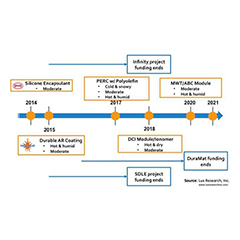The biggest growth opportunities in solar often lie in emerging markets located in harsh climates, so technologies to make modules more durable are growing in demand, says Lux Research
BOSTON, MA – November 10, 2016 – Material innovation is ramping up in solar as the industry aims to address the widespread decrease in performance over time that affects photovoltaic (PV) modules, according to Lux Research.
Solar modules degrade over the years, due to environmental factors, causing performance drops and even failures. Such degradation is growing in importance because of its impact on financial models, long-term reliability, and adoption in regions with extreme climates.
“New evidence of climate-dependent degradation is creating new opportunities for non-standard material adoption in module packaging,” said Tyler Ogden, Lux Research Analyst and lead author of the report titled, “Extending Lifetime and Performance: Breaking Down the Photovoltaic Module.”
“Recently unveiled module lines from Yingli and BYD use new materials, while other new module assembly designs are likely to be offered over the next five years,” he added.
Opportunities Exist for New Modules to See Adoption While Degradation Knowledge Grows in Research
Lux Research analysts examined new initiatives to arrest degradation of PV modules and their potential benefits. Among their findings:
- Growth markets lie in harsh climes. Better ways to prevent degradation are key because many promising emerging solar markets lie in extreme climate zones: Mexico, Chile, Turkey, South Africa, India, and Malaysia.
- No single technology will do the trick. A next generation metal wrap through (MWT) module with polyolefin encapsulation offers performance benefits in moderate, and hot and humid climates, while Solaria and Yingli modules are optimal in hot and dry zones. Standard glass/glass technology with polyolefin encapsulation leads in cold and snowy places.
- Case Western, Carinthian, and NREL focus on research. Case Western Reserve University, Austria’s Carinthian Tech, and NREL–among others –are leading initiatives to address degradation of PV modules. Case Western’s Solar Durability and Lifetime Extension Center is developing lab tests that can predict a material’s lifetime performance in a specific region.
The report, titled “Extending Lifetime and Performance: Breaking Down the Photovoltaic Module,” is part of the Lux Research Solar Intelligence service.
About Lux Research
Lux Research provides strategic advice and ongoing intelligence for emerging technologies. Leaders in business, finance and government rely on us to help them make informed strategic decisions. Through our unique research approach focused on primary research and our extensive global network, we deliver insight, connections and competitive advantage to our clients. Visit www.luxresearchinc.com for more information.


























